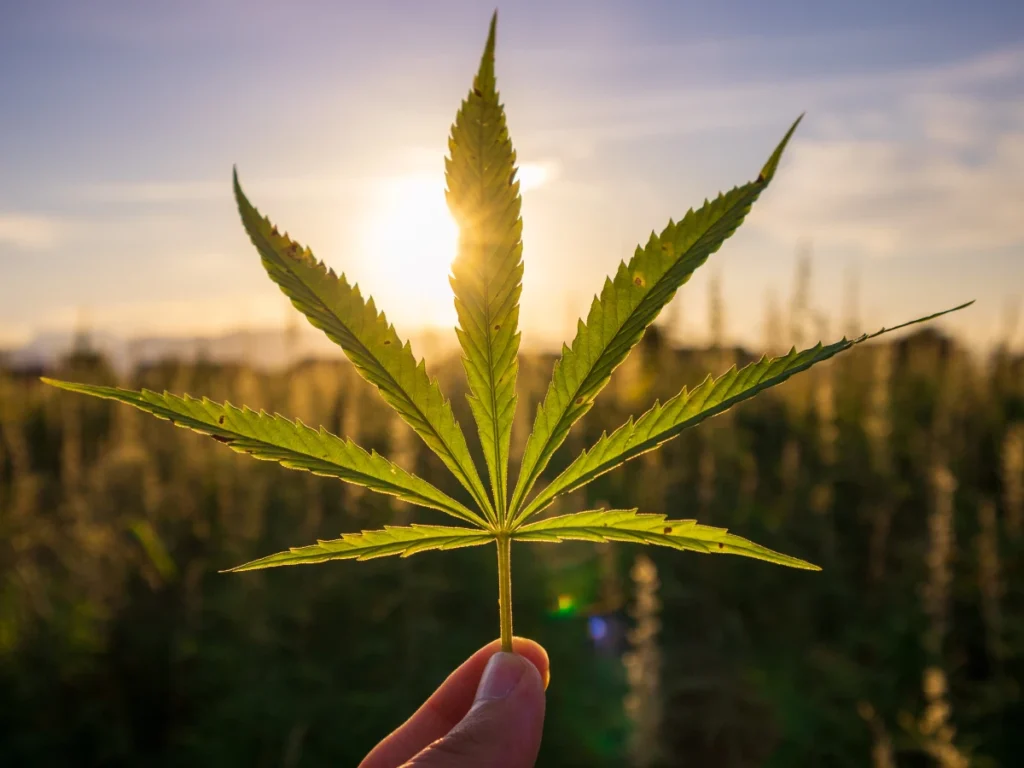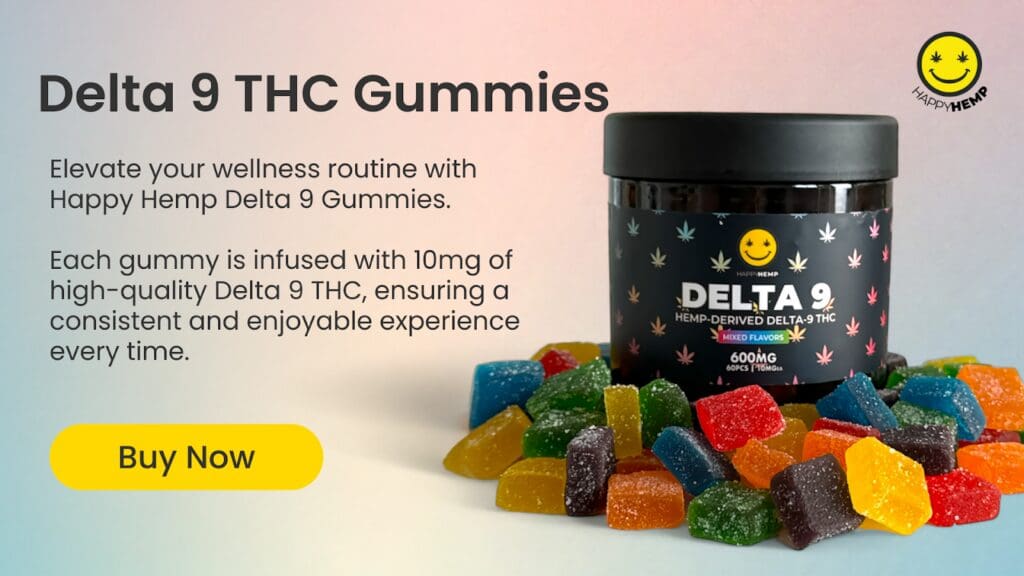Key Takeaways:
- THCA Is Non-Psychoactive: THCA, found in raw cannabis, does not produce the “high” associated with THC unless it is heated and converted through decarboxylation.
- Potential Wellness Benefits: THCA shows promise for anti-inflammatory, neuroprotective, and antioxidant benefits, making it an appealing option for wellness support.
- Mindful Usage and Legal Awareness Are Essential: To safely and legally use THCA, avoid heating it unnecessarily and always check local regulations and product lab tests.
If you’ve ever heard the term THCA tossed around in conversations about hemp or cannabis, you might be wondering what it actually means. THCA, or tetrahydrocannabinolic acid, is often overshadowed by its better-known counterpart, THC. But here’s the thing: THCA has its own unique properties and potential benefits that are worth exploring.
Happy Hemp built its reputation on providing high-quality THCA products, and we pride ourselves on staying at the forefront of hemp education. With our expertise, you can trust that you’re getting reliable, accurate, and practical information about THCA.
In this article, we aim to give you a clear picture of what THCA is, how it compares to THC, and why it’s becoming a topic of interest. Whether you’re curious about its potential benefits or want to know how to use it safely, we’ve got you covered.
What Is THCA? An Introduction
THCA stands for tetrahydrocannabinolic acid, a compound naturally found in raw cannabis and hemp plants. Think of it as THC’s “precursor”—it’s present in fresh plants before any heat or processing occurs. When cannabis is exposed to heat through smoking, vaping, or cooking, THCA transforms into THC in a process called decarboxylation.
Interestingly, THCA itself is non-psychoactive, meaning it doesn’t produce the “high” associated with THC. However, it has caught attention for its potential wellness benefits, from anti-inflammatory properties to neuroprotective effects.
How THCA Differs From THC
At first glance, THCA and THC might seem like two sides of the same coin—they’re closely related, after all. But they’re actually quite different in how they behave and what they do:
- Psychoactivity: THCA is non-psychoactive, meaning it won’t produce the euphoric “high” that THC is known for. This is because THCA doesn’t bind to the CB1 receptors in the brain, which are responsible for the mind-altering effects of THC. In contrast, THC fits perfectly into these receptors, creating the well-known psychoactive experience.
- Formation: THCA exists in raw cannabis and only transforms into THC when exposed to heat, in a process called decarboxylation. This means that fresh, unprocessed cannabis is rich in THCA, and unless it’s heated through smoking, vaping, or cooking, it won’t convert into THC.
- Potential Benefits: THC is commonly recognized for its medical and recreational benefits, including pain relief, appetite stimulation, and aiding sleep. On the other hand, THCA has gained attention for its unique properties, such as anti-inflammatory effects, neuroprotection, and anti-nausea potential.
How THCA Works: The Science Behind It
THCA works in your body differently than THC, thanks to its unique chemical structure. Unlike THC, which binds directly to the CB1 receptors in your brain, THCA doesn’t fit into those receptors. This is why it doesn’t produce any psychoactive effects—it simply doesn’t interact with the brain in the same way.
Instead, THCA interacts with other parts of your body, particularly the endocannabinoid system (ECS). The ECS is like a regulatory network that helps maintain balance (or homeostasis) in things like mood, sleep, pain, and immune responses. THCA is believed to influence this system indirectly, potentially reducing inflammation, calming nausea, and supporting cellular health.
However, because THCA isn’t as well-studied as THC or CBD, scientists are still uncovering exactly how it works and what it can do. Early research is promising, but there’s much more to learn about its interaction with the body.
The Benefits And Effects Of THCA
While research is still in its early stages, here are some of the key areas where THCA shows promise:
Anti-Inflammatory Properties
THCA is being explored for its ability to reduce inflammation, which is the root cause of many chronic conditions like arthritis and autoimmune disorders. By interacting with the endocannabinoid system, THCA may help regulate the immune response, potentially easing symptoms of swelling, stiffness, and pain. This makes it appealing for people looking for natural alternatives to over-the-counter anti-inflammatory medications.
Neuroprotective Effects
Research suggests that THCA may have neuroprotective properties, meaning it could help protect brain cells from damage caused by aging, injury, or disease. Early studies indicate that its antioxidant abilities may combat oxidative stress, a major contributor to neurodegenerative conditions like Alzheimer’s and Parkinson’s disease. For those concerned about long-term brain health, THCA might offer a preventative benefit worth exploring.
Anti-Nausea And Appetite Support
For individuals struggling with nausea, whether due to motion sickness, pregnancy, or treatments like chemotherapy, THCA has shown promise in calming the stomach. Unlike THC, which also aids nausea but comes with psychoactive effects, THCA offers a non-intoxicating alternative. Additionally, it may gently stimulate appetite, which is crucial for those dealing with eating difficulties or weight loss related to illness.
Antioxidant Properties
Antioxidants are essential for protecting the body from free radicals—unstable molecules that can damage cells and accelerate aging or contribute to diseases like cancer. THCA appears to act as a natural antioxidant, helping to neutralize these harmful molecules and promote cellular health. This role makes THCA potentially useful for overall wellness and supporting the body’s natural defenses against stress and environmental toxins.
Muscle Relaxation
THCA may also contribute to muscle relaxation, making it beneficial for people dealing with muscle tension, spasms, or cramping. This effect could be particularly useful for athletes or individuals with conditions like multiple sclerosis, which often involve muscle-related discomfort. While the exact mechanism isn’t fully understood, many users report a noticeable calming of physical tension after using THCA-rich products.
Popular Forms Of THCA Products And How To Use Them
THCA is available in various forms, catering to different preferences and needs. Each form has its own way of being used, and the right choice depends on what you’re looking for. Here’s a breakdown of the most common THCA product types and how to use them:
Raw Cannabis Or Hemp
Raw cannabis or hemp is one of the simplest ways to access THCA in its natural form. When consumed fresh, such as by juicing the leaves or blending them into a smoothie, the THCA remains intact. This method is especially appealing for those seeking the benefits of THCA without any psychoactive effects.
THCA Tinctures
THCA tinctures are liquid extracts, typically mixed with a carrier oil, that allow for easy and controlled dosing. These can be taken sublingually (under the tongue) for quicker absorption or added to drinks or food. They are an excellent option for those who want to enjoy THCA discreetly.
Topicals
THCA-infused topicals, such as creams, balms, or lotions, are designed for external use and provide localized relief. These products are popular for managing issues like joint pain or inflammation. Since they don’t penetrate deeply enough to enter the bloodstream, they won’t cause psychoactive effects even if exposed to heat.
Vapes And Concentrates
THCA concentrates are a popular choice for those seeking a potent and fast-acting form of the compound. These products are typically used with specialized devices that allow for precision and convenience, making them appealing to experienced users. Vapes and concentrates are versatile and come in a variety of formulations, giving users options to suit their preferences and routines.
Precaution Tips When Using THCA
While THCA offers promising benefits, it’s essential to use it mindfully. Like any hemp or cannabis product, there are a few things to keep in mind to ensure a safe and effective experience:
Start With Small Doses
If you’re new to THCA, starting with a small dose is the safest way to understand how your body reacts. Since THCA affects everyone differently, jumping into higher amounts may overwhelm your system or cause unintended effects, especially if it accidentally converts into THC. Begin with a minimal dose, observe how you feel over a few hours, and gradually increase if needed.
Check Product Labels
Not all THCA products are made equally, so reading the label is critical. Look for third-party lab results that verify the product’s purity and ensure it’s free from harmful contaminants like mold, heavy metals, or pesticides. These tests also confirm the THCA content, helping you make an informed decision about what you’re consuming.
Know The Source
Where and how the hemp or cannabis was grown makes a big difference in quality. Products from reputable brands that focus on organic, pesticide-free farming are generally safer and more effective. Knowing the source can give you peace of mind and ensure you’re not ingesting unwanted chemicals along with your THCA.
Be Aware Of Heat Exposure
THCA transforms into THC when exposed to heat, so be cautious about how you store or use it. If you’re seeking the non-psychoactive benefits of THCA, avoid heating it through smoking, vaping, or cooking. Even exposure to sunlight or warm storage conditions can start the conversion process, so store it in a cool, dark place.
Consult A Professional
If you’re planning to use THCA for specific health concerns, it’s a good idea to consult a doctor or cannabis specialist first. This is especially important if you’re on other medications, as cannabinoids can interact with some drugs and alter their effects. A professional can help you figure out safe dosages and the right product for your needs.
Monitor For Allergies Or Sensitivities
Although rare, some people may be sensitive to cannabis products, experiencing mild allergic reactions or stomach discomfort. If you notice unusual symptoms, like skin irritation or nausea, stop using the product immediately. Consult a healthcare professional if the symptoms persist or seem severe.
Is THCA Legal? Understanding The Law
The legal status of THCA can be a bit tricky because it depends on where you live and how THCA is classified. While THCA itself is non-psychoactive, its connection to THC—the compound responsible for the cannabis “high”—makes it a gray area in some regions. Here’s a breakdown of what you need to know:
Federal Law In The United States
Under U.S. federal law, THCA derived from hemp is generally considered legal as long as the hemp contains less than 0.3% THC by dry weight. This was established by the 2018 Farm Bill, which legalized hemp and its derivatives. However, once THCA is heated and converts to THC, it may fall under stricter regulations.
State Laws
THCA’s legality varies from state to state. In states where cannabis is fully legalized, THCA products are typically allowed. However, in states where only hemp-derived products are legal, THCA might be subject to stricter oversight. Always check your local laws before purchasing or using THCA.
International Laws
Globally, THCA’s legal status also depends on local cannabis and hemp regulations. Some countries classify THCA similarly to THC, while others treat it as a non-psychoactive compound. If you’re traveling, it’s crucial to research the laws of your destination.
Final Thoughts
THCA may not be as well-known as THC or CBD, but it’s quickly carving out its own place in the hemp and cannabis industry. From its potential anti-inflammatory and neuroprotective benefits to its non-psychoactive nature, THCA offers a unique way to explore the wellness potential of cannabis without the high.
That said, it’s important to approach THCA with a good understanding of how it works and how to use it safely. Whether you’re adding raw cannabis to your smoothies, trying a THCA tincture, or exploring other forms, be mindful of how heat can transform THCA into THC. And don’t forget to check your local laws to ensure you’re staying within legal boundaries.
Read also:
- How Long Does THCA Stay In Your System? Understanding Detection Times
- Delta 8 For Anxiety Relief – A Soothing Approach
- Unveiling Happy Hemp’s Take on the Latest Cannabis Trends: Delta-8 THC, THC-O, and More
Frequently Asked Questions About THCA
Does THCA get you high?
No, THCA does not get you high because it is non-psychoactive. It only becomes psychoactive when heated, converting into THC.
Is THCA natural or synthetic?
THCA is a natural compound found in raw cannabis and hemp plants.
Is THCA indica or sativa?
THCA can be present in both indica and sativa strains, as it is a precursor to THC in all cannabis plants.
Is THCA harmful?
THCA is generally considered safe, but like any compound, it should be used responsibly and with awareness of potential allergies or sensitivities.
What strain has the highest THCA?
Strains such as Gorilla Glue, Girl Scout Cookies, and Bruce Banner are often high in THCA content, though specific levels vary by grower.
What is the best way to use THCA?
The best way to use THCA depends on your goals. For non-psychoactive benefits, consume it raw or as a tincture. For psychoactive effects, heat it to convert it into THC.
Is THCA detectable in urine?
If THCA is converted to THC through heating and consumed, it may result in THC metabolites, which are detectable in urine drug tests.
Can you vape THCA?
Yes, you can vape THCA, but the heat will convert it into THC, making it psychoactive.
Who discovered THCA?
THCA was first isolated and identified by Israeli chemist Dr. Raphael Mechoulam and his team, who are pioneers in cannabis research.
How do I activate my THCA?
You activate THCA by exposing it to heat through methods like smoking, vaping, or cooking (decarboxylation).
Sources:
- Nadal, X., del Río, C., Casano, S., Palomares, B., Ferreiro-Vera, C., Navarrete, C., Sánchez-Carnerero, C., Cantarero, I., Bellido, M. L., Meyer, S., Morello, G., Appendino, G., & Muñoz, E. (2017). Tetrahydrocannabinolic acid is a potent PPARγ agonist with neuroprotective activity. British Journal of Pharmacology, 174(23), 4263–4276. https://doi.org/10.1111/bph.14019
- McPartland, J. M., MacDonald, C., Young, M., Grant, P. S., Furkert, D. P., & Glass, M. (2017). Affinity and Efficacy Studies of Tetrahydrocannabinolic Acid A at Cannabinoid Receptor Types One and Two. Cannabis and Cannabinoid Research, 2(1), 87–95. https://doi.org/10.1089/can.2016.0032
- Palomares, B., Ruiz-Pino, F., Garrido-Rodriguez, M., Prados, M. E., Sánchez-Garrido, M. A., Velasco, I., … & Muñoz, E. (2020). Tetrahydrocannabinolic acid A (THCA-A) reduces adiposity and prevents metabolic disease caused by diet-induced obesity. Biochemical pharmacology, 171, 113693.









